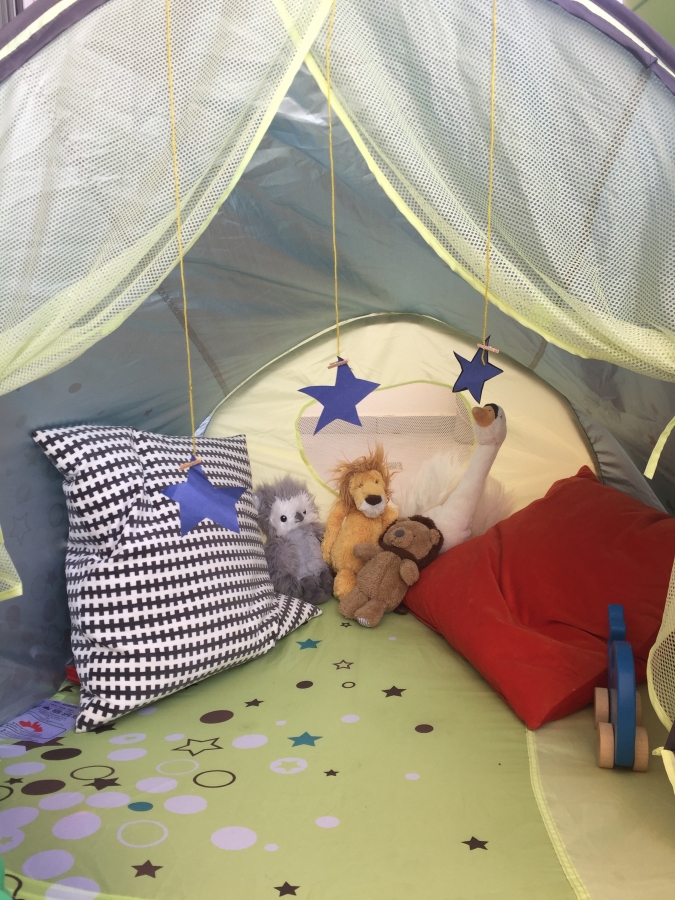The tent is a physical reminder for us to take time to be close to our loved ones and to ourselves.

I recently moved to Israel and was looking through a local parenting Facebook group. I came upon a post asking people to share family rituals. Of course, my “Ritualwell editor” radar went off. Many commenters shared Shabbat customs: playing games or trivia, sharing a highlight of your day or week, telling jokes, dancing in the living room, French toast on Shabbat morning. One person shared that their parents used to make a “Shabbat plate” for them each week filled with treats that she would look forward to all week. Another comment caught my eye: camping out in the living room! This sparked my idea for the Shabbat Tent.
Friday night Shabbat dinner was always special for me as a kid, and I have enjoyed sharing this custom with my two little kids, who are 2.5 years old and 9 months old. The Shabbat Tent adds an extra special dimension to the evening. The first time I did this I told my older son to look forward to a special surprise for dessert. After dinner I dramatically asked, “Are you ready for the surprise?” He smiled excitedly. I went into the other room and returned with our beach tent, popped it open, and shouted, “It’s the Shabbat Tent!” He squealed with delight. (It doesn’t take much to entertain a toddler!) I put the Shabbat Tent on our apartment terrace where we could see the sky. We ate our dessert in the tent, played with toys, and read books. We waited to spot three stars in the sky to mark the official start of Shabbat. This last week, before Shabbat dinner, we did a craft project where we cut out three stars from construction paper and strung them up on the tent. I wrote the words “Love,” “Peace,” and “Hope” on the stars in English and Hebrew. When my kids get older I will ask them to write a word or phrase that makes them happy on their star, something they hope for, or something they are grateful for this week.
This practice can be done with adults or kids of any age. It could be fun to do with kids at summer camp or at home. Now that I’ve done it a few times, I’ve found it’s a way to encourage family connection and fun. Especially when the week can be stressful, balancing work and parenting, I now look forward to this special time, and so does my son. The Shabbat Tent reminds me of the concept of sukkat shalom, a sukkah of peace, the embracing wings of the Shekhinah who we invite into our homes on Shabbat. The tent is a physical reminder for us to take time to be close to our loved ones and to ourselves. It is a symbol of safety, love, and inclusion.

The Ritual
1. You can use any kind of tent or build a fort with blankets. This ritual can be done in the living room, but would be extra fun outdoors in a backyard or on a terrace during warmer weather. I like to put pillows in the tent, along with dolls or stuffed animals, our “Shabbat guests.”

2. Cut out three Shabbat Stars from construction paper. With older kids or adults you can write a blessing, wish, or something you are grateful for this week on each star. It could even be just one word. Then hang the stars in the tent.
3. Spend time together in the tent, either before or after Shabbat dinner. Have each person choose a special game, toy, or book (just no phones or screens, of course!). Sing songs, tell stories, wait to see the stars together. Lie together in silence. Breathe.
4. If you like, leave the Shabbat Tent out for the duration of Shabbat and hang out there during the day, take a nap, relax.
This is a very adaptable ritual depending on the age and number of participants. You could add other craft projects for decorating the tent and make this ritual your own. The key is to use the time to connect with family and/or friends. The possibilities are endless!
Hila Ratzabi is the Editor of Ritualwell.org.





